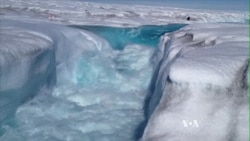Global warming is on the political agenda this week with a pair of meetings in Germany, where world leaders pledged to act on climate change, and negotiators are crafting the language for a new climate treaty.
World leaders at the G-7 summit in Bavaria urged “urgent and concrete action” on climate change. President Barack Obama observed that progress has been made toward a global treaty to replace the Kyoto Protocol, the agreement that expired in 2012.
“We continue to make steps towards a strong global climate agreement this year in Paris. All the G-7 countries have now put forward our post 2020 targets for reducing carbon emissions and will continue to urge other significant emitters to do so as well,” said Obama.
Leaders affirmed the goal of keeping global temperatures from rising more than 2 degrees Celsius from pre-industrial times. Experts say that would avoid the most catastrophic impacts of climate change, like sea-level rise and more severe droughts and storms.
Binding reductions; help for poor nations
German Chancellor Angela Merkel said binding rules for emissions reductions must be at the heart of any new climate agreement.
“The world does not have any binding rules at the moment and therefore that must be a goal in Paris,” she insisted.
The G-7 leaders also renewed a commitment to provide $100 billion annually, beginning in 2020, to help poorer nations adapt to climate change. Finance has been a sticking point, in which poor countries insist the major polluters foot the bill. Merkel said it is important to set this goal before the December climate conference in Paris. Otherwise, she added, developing countries and small island nations would have difficulty accepting the agreement.
Among the other pledges from the G-7 was one that would phase out fossil fuels by the end of the century.
Crafting the language
Those pledges sent strong signals to climate negotiators meeting in Bonn, Germany. For a second week, representatives from nearly 200 countries are streamlining language for a new climate treaty. That is not an easy job, according to Jennifer Morgan, director of the Global Climate Program for the World Resources Institute.
“It’s all right now about building trust, about making sure that everybody knows what’s going on and about narrowing that text down, and hopefully in the coming days it will start moving more quickly. They still have a lot to do,” said Morgan.
So, for example, Morgan said the treaty must clarify the G-7 goal to limit warming to "no more than 2 degrees Celsius from pre-industrial times."
She asked, “Is that a certain percentage of reductions of emissions? Is that a de-carbonization of the economy? Is that a phase-out of emissions — what is that? And that long-term goal hopefully can send a signal to investors to how they should make future business decisions.”
Leaders' support
Morgan is optimistic about a new climate agreement, given renewed support from world leaders.
“And I think that it’s a signal that people around the world need to engage with their governments to tell them what they want. Some of the shifts that occurred at the G-7 were because of civil society stating what they needed to see from their leaders. This is the time to engage. It is the final stretch.”
Negotiators are expected to meet again over the next several months to finalize the text. Hopes are riding high that a new agreement will put the brakes on rising emissions with a move toward cleaner energy for the planet.












